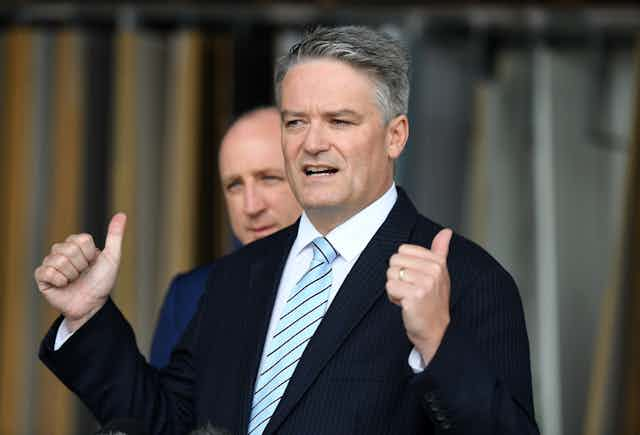You can’t help loving how the boy from Belgium is relishing his chance to walk in prime ministerial shoes, even if they’re borrowed ones and he can occupy them only briefly.
Mathias Cormann, whose glory moment has been picked up back in his home country, swarms over the media at any available opportunity, so it’s not surprising he’s taking full advantage of this rare moment as acting prime minister.
Luckily for Malcolm Turnbull – who’s having virtually no luck at the moment – Cormann is a man of detail, who treads carefully (even if he did have that brain-snap in the 2016 election, heaping praise on Bill Shorten, when he meant Turnbull – a slip that mortified him).
While many in the government were groaning at Barnaby Joyce’s self-serving media appearances while on “leave”, Cormann cast the deputy prime minister as moving to “put some order into some deeply personal matters that previously have spilled over into the professional domain”.
A Joyce loyalist noted the contrast between Cormann’s measured and quite sympathetic tone and Turnbull’s moral denunciation (and sex ban) that last week re-inflamed the crisis. If Turnbull had sounded more like Cormann the matter mightn’t have got such new life. But Turnbull was playing to his own political needs, as he saw them.
Cormann’s skills will be important next week, when the government faces Senate estimates, with probing about the arrangements for Joyce’s former staffer, now partner, Vikki Campion.
In the lower house Turnbull, fresh from his US trip, and Joyce, reeling from his faux leave, will face days of ferocious questioning.
That’s assuming Joyce is not removed by his party. Or doesn’t capitulate to the pressure, belatedly citing the good of the government.
His position appears to have been weakened rather than strengthened by his publicity tactic. On Thursday, Victorian Nationals MP Andrew Broad called for him to stand down, declaring he would raise the leadership in the partyroom on Monday (not all 21 Nationals will be there – a spill would require a separate meeting).
Joyce received another blow on Thursday, with the revelation a woman had made a complaint of sexual harassment against him (which he denies) to Nationals federal president Larry Anthony.
It’s unclear whether Joyce’s apparent command of the numbers up to this point would change if the Nationals had a spill motion before them.
If Joyce is still in his seat at the end of next week, the Nationals will have little choice but to bunker down behind him, in the vain hope that his claim his skin will repair is correct.
As of now, the Nationals are a party in shock, paralysed by an extraordinary, fluid and unpredictable situation.
On another front, the government this week was clumsy in its handling of Tony Abbott’s call for immigration to be slashed.
The former prime minister’s proposal might be judged bad policy – certainly that is my opinion – and seen as deliberate provocation, but it will resonate with many Coalition voters and potential supporters on the right.
It was a mistake to let Treasurer Scott Morrison lead the charge against Abbott – a better strategy would have been to leave it to Home Affairs Minister Peter Dutton, whose portfolio includes immigration.
Abbott remains bitter about Morrison, a residue of the events of 2015. That turned Morrison’s takedown on immigration into something personal for Abbott, who countered by accusing Morrison of being prisoner of his department and declaring: “Scott should have the gumption to think for himself”.
If Dutton (who did make some comments) had carried the counter-case, the issue might have been lower-key. After all, it was not the first time Abbott has waded into this debate and it didn’t have to become such a big noisy story.
With the volume at full blast from both the Joyce and Abbott issues, the government drowned out Labor, where Shorten is trying to manage the party’s Adani policy, buffeted by the Batman byelection and the demands of the Queensland constituency, including a possible future byelection in Longman.
Early this month, at the start of the Batman campaign, Shorten appeared to be moving toward opposing the Adani project. He highlighted a claim that Adani put in an altered laboratory report when appealing a fine for contamination of wetlands, and said if Adani was “relying on false information” the mine didn’t deserve to go ahead.
Shadow cabinet discussed the Adani issue without reaching a decision.
Labor now appears to have walked back to a “let things take their course” line, in the expectation that Adani will fall over of its own accord.
Labor’s infrastructure spokesman Anthony Albanese said this week that government should set the broad policy framework, rather than deal project by project, and also pointed out that Adani has previously received the necessary approvals.
“What you don’t do is single out particular projects and then retrospectively change existing laws which would have ramifications across the board,” he said. “Very clearly the economics of the [Adani] project haven’t stacked up” so it had not been able to get finance.
Shorten this week was in northern Queensland announcing initiatives on jobs, hoping to inoculate Labor against allegations that by not supporting Adani it would cost the region employment.
As Shorten returns to the seat of Batman, which Labor is desperate to hold against the Greens’ push, there will be keen interest in whether he sticks to his line that Adani’s future depends on whether it stacks up commercially and environmentally, or he declares that Adani is already dead because it hasn’t jumped the commercial hurdles.
In the meantime, Labor can only be relieved that at least nationally, the government’s woes have given it useful cover as it struggles with its awkward Adani juggle.

